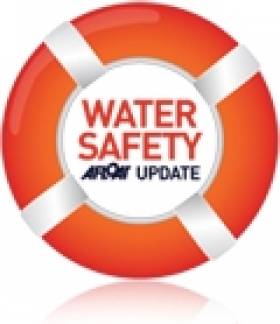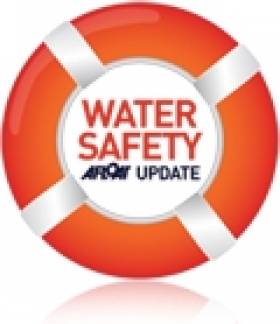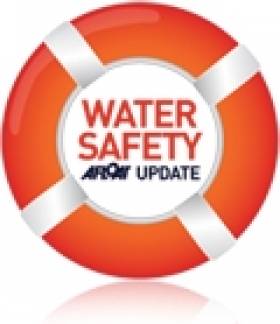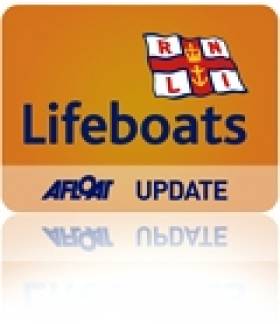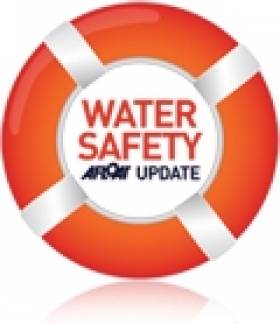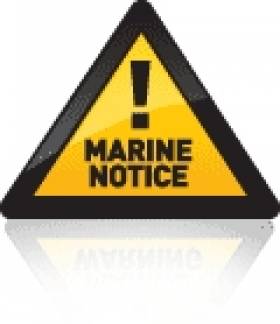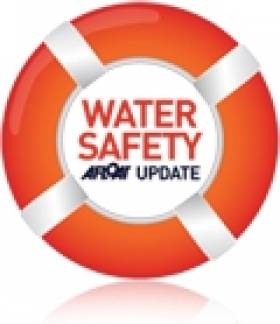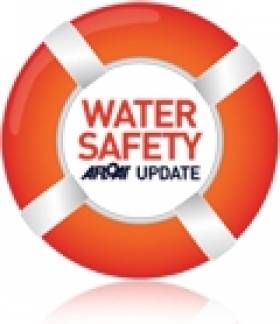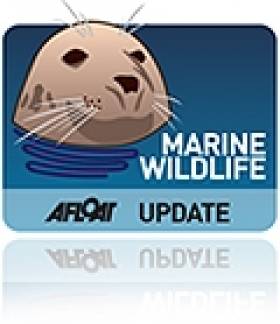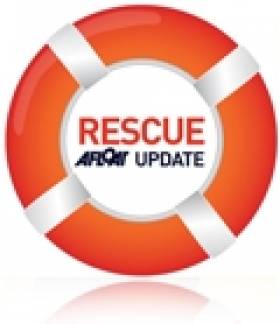Displaying items by tag: water safety
National Lifeguard Training Centre Opens In Tramore
#WaterSafety - Tomorrow (Monday 9 March) sees the opening of the new National Lifeguard Training Centre in Tramore, Co Waterford, as The Irish Times reports.
The €500,000 inter-agency initiative will have a focus on training people for the growing discipline of surf lifesaving both around Ireland and abroad.
But the three-storey facility on Tramore's Lower Promenade has practical water safety implications for beachgoers over the summer months, as the town's duty lifeguards will have a panoramic view of the strand and shore from the observation deck.
The Irish Times has more on the story HERE.
#WaterSafety - The RNLI is advising anyone planning on visiting its lifeguarded beaches on the North Coast to stay well away from dangerous cliff edges that have been impacted by recent weather conditions.
Winter storms have dramatically changed the profile of beaches at Whiterocks, Portrush East and Portstewart, creating high sand cliffs that are unstable. RNLI lifeguard manager Mike Grocott is asking the public to be mindful of the changes ahead of making a visit.
"Winter storms have taken their toll on the make-up of some of the beaches this year, particularly at Whiterocks, Portrush East and Portstewart, and many people returning to these favourite spots may be surprised at how different everything looks.
"This includes significant erosion of the sand dunes where gentle slopes have washed away leaving sheer sand cliffs, some of which are up to 18 feet high.
"Access points have been altered and on some beaches the shifting sand has left deep channels that in turn create strong rip currents.
"We would encourage anyone planning a trip to one of these beaches to put safety first and be mindful that these sand cliffs are falling away and may be unstable. The best advice is to stay away from the sand cliff edges and bases."
Meanwhile, RNLI lifeguards are busy preparing for a new season where they will be patrolling 10 beaches in Northern Ireland during the summer. Last year RNLI lifeguards responded to 251 incidents, assisting 284 people.
Beach Safety Programmes For Northern Ireland Schools
#WaterSafety - The RNLI is encouraging primary schools in Northern Ireland to sign up for two of its beach safety education programmes when they get under way next month.
Running from March to June, Meet the Lifeguards and Hit the Surf aim to educate pupils in P5-P7 on the importance of beach safety in a fun and practical way.
Meet the Lifeguards gives pupils the opportunity to participate in an informative and interactive session when RNLI lifeguards visit their school. The 45-minute presentation focuses on equipping pupils with key safety advice that they can put to use when they visit a beach with family and friends.
Pupils will learn more about the RNLI, the charity that saves lives at sea and the role of the RNLI lifeguard on the beach. They will be educated on what the different beach safety flags and signs mean; the safety of using inflatables while swimming; and how to identify natural and man-made hazards. They will also learn about body boarding and surfing safety, rip currents and how to escape them and safety information on tides and waves.
Hit the Surf, meanwhile, offers a unique opportunity for school children to get practical lessons in lifesaving and beach safety at one of the 10 RNLI lifeguarded beaches located on the north coast and in Co Down.
The session, which lasts two-and-a-half hours, includes a theory lesson on staying safe at the beach and the role of the RNLI and its lifeguards. It's followed by practical lessons in lifesaving and surf-based skills while building pupils confidence in the sea. The pupils will also learn about local hazards and the beach environment.
RNLI lifeguard supervisor Tim Doran is encouraging schools to get involved. "Education and prevention are an important part of the RNLI’s work and programmes such as Meet the Lifeguards and Hit the Surf enable us as lifeguards to deliver important beach safety advice in a way that is both informative and engaging," he says.
"We hope that pupils can then take what they learn, share it with family and friends and use it to have fun in a safe way when they visit a beach."
Last year, RNLI lifeguards in Northern Ireland responded to 251 incidents, assisting 284 people.
"With the profile of the beaches changing after winter storms, the RNLI lifeguards were kept busy in 2014," says Doran. "With rip currents and changing landscapes, the lifeguards engaged in a large amount of preventative work, speaking to beach users and advising of the safest places to swim."
For more information on how to book your school onto an RNLI education programme, please contact 028 7087 8492 or email [email protected]
Ireland's RNLI Lifeboats Rescued More Than 1,400 People In 2014
#RNLI - Ireland's RNLI lifeboat crews launched 1,089 times in 2014, bringing 1,414 people to safety.
And the lifesaving charity is calling for the public to think ahead and never underestimate the strength and power of the sea and inland waters as it today releases its 2014 lifeboat launch and rescue statistics, based on detailed returns of service, from each of its 45 lifeboat stations in Ireland.
The figures show more people are getting into difficulty on leisure craft, and the RNLI advises that proper safety advice and maintenance is vital to ensure people stay safe on the water.
The busiest lifeboat station on the island of Ireland last year was Lough Ree RNLI in Athlone. The charity’s lifeboat crew there launched 69 times and brought 142 people to safety.
This was followed by Howth RNLI, which had 62 launches and brought 107 people to safety, making it their busiest year ever.
Dun Laoghaire RNLI in south Dublin launched 56 times and brought 55 people to safety, while lifeboat crews on the Aran Islands off Galway and Arranmore Island off Donegal launched 78 times, helping 80 people.
Enniskillen RNLI on Lough Erne, which operates two separate lifeboat stations on the upper and lower lough, also had a busy year with 59 calls for assistance and 57 people brought ashore.
Elsewhere in Northern Ireland, Bangor RNLI in Co Down was the busiest single site station, launching 49 times and helping 51 people. Portrush RNLI on the Antrim coast launched their lifeboats 31 times and brought 28 people to safety.
In all, RNLI lifeboats in Northern Ireland launched 261 times in 2014, bringing 281 people to safety, while the charity’s lifeguards helped 284 people on 10 beaches during the season.
Compared to the previous year, when they launched 255 times, NI lifeboat launches show a slight increase. A total of 36 more people were brought to safety by RNLI lifeboats in 2014.
While lifeboat launch figures throughout the island of Ireland remain largely the same as last year, there has been a 10% increase in the amount of people brought to safety by lifeboats.
The types of callouts that the RNLI responded to last year included aid to leisure craft users (536), assistance to fishing vessels (140), help to people who got into difficulty along the shoreline (119) and to people in the water (185).
"These figures are based on every lifeboat station in the RNLI returning a detailed service report and are a valuable insight into what our volunteer lifeboat crews are facing when they launch and what conditions they face," said RNLI operations manager Owen Medland.
"Overall 35% of our lifeboat callouts were carried out in the hours of darkness. Almost half of the callouts last year were to leisure vessels and of these callouts many were to groundings and engine problems.
"Breaking down at sea or on a lough can be a frightening experience. Weather and darkness can turn a bad situation very serious in a matter of minutes. Nobody who sets out thinks anything bad will happen but calling for help early is always the right choice."
Medland continued: "Our volunteer lifeboat and shore crews have shown the commitment and courage we have come to rely on them for, but we must also thank our supporters and fundraisers, who work tirelessly to ensure the charity, which is dependent on donations from the public continues.
"There are also hundreds of employers around the country who let our lifeboat crews drop what they are doing and respond to a callout. We would not be able to run this service without them and we are extremely grateful to them for that."
Last year also saw the introduction of the RNLI’s 45th lifeboat station in Ireland, when Union Hall RNLI in south west Cork went on trial for a 24-month period in November.
And in the coming months, Lough Swilly RNLI in Buncrana, Co Donegal will become the first station in Ireland to receive the new Shannon-class lifeboat.
The €2.4 million lifeboat, which is due to arrive later this year, is the first class of lifeboat to be named after an Irish river, recognition by the charity of the role of Irish lifeboat crews and volunteers throughout the history of the RNLI.
In 2014 the charity marked 190 years of lifesaving and the RNLI is aiming to reduce coastal drowning significantly by 2024.
To do this, it will be expanding its preventative work and will launch Respect the Water, engaging with water users on how to stay safe and maintain their equipment. Water safety advice is available on rnli.org/safety.
Making A Better Kill Cord
#KillCord - Kill cords are an invaluable safety feature for both professional and leisure boat helms, but the system is far from perfect. It's easy to neglect to attach them, as was the case in last year's RIB tragedy in Cornwall, and sometimes they can malfunction, causing a boat to go out of control.
But there are a number of alternative solutions on the market that aim to make the use of kill cords as seamless as possible, as Motor Boat & Yachting reports.
The key to ease of use is wireless - a radio transmitter that you can wear as a clip or lanyard and never have to worry about it, as the engine is cut off automatically as soon as you're out of range.
Two wireless solutions are already available, however they are by no means foolproof, relying on batteries for power. MBY readers have already suggested a significant improvement, using RFID tags to make even smaller transmitters that don't need a power source, but even that comes with its own cons.
Motor Boat & Yachting has much more on the story HERE.
Marine Notice: Recovery Of Persons From The Water
#WaterSafety - The Department of Transport, Tourism and Sport advises that, in accordance with SOLAS Chapter III Regulation 17-1, 'Recovery of persons from the water', cargo ships over 500 gross tonnage and all passenger ships on international voyages shall develop ship-specific plans and procedures for recovery of persons from the water.
The plans and procedures shall identify the equipment intended to be used for recovery purposes and measures to be taken to minimise the risk to shipboard personnel involved in recovery operations.
Ships constructed before 1 July 2014 shall comply with this requirement by the first periodical or renewal safety equipment survey of the ship to be carried out after 1 July 2014, whichever comes first.
The plans and procedures shall be developed taking into account MSC 1/Circ 1447 'Guidelines for the Development of Plans and Procedures for Recovery of Persons from the Water'; MSC 1/Circ 1182 'Guide to Recovery Techniques'; and MSC 1/Circ 1185/Rev 1 'Guide for Cold Water Survival'.
Lifeguards Compete in IWS National Beach Rescue Championships
#watersafety – After a busy Summer season, Ireland's top Lifeguards will compete in the IWS National Beach Rescue Championships at Brittas Bay, Wicklow tomorrow. (9am-5pm, Saturday 6th Sept.)
Competitors will gather from counties nationwide and will include lifeguards from Ireland's International Lifesaving Team who will compete in the World Lifesaving Championships in France on September 16th.
Competitors at the National Championships will have their skills tested in events that simulate emergency rescue scenarios.
Teams will fend off strong competition from the fittest Lifeguards nationwide - the most significant and breathtaking life saving competition in Ireland. Ireland's best Lifesavers will contend with the open water conditions at Brittas Bay coast to rescue potential "casualties" in testing swim races, rescue board races and other competitive events.
On average, 135 people drown in Ireland every year yet this figure would be far higher but for the actions of trained Lifesavers. Last summer for example, Lifeguards rescued nearly 900 people from drowning and reunited almost 1,000 children found wandering near water.
Commenting on the additional challenges of open water competitions, the Chairman of Irish Water Safety's Sports Commission, Seamus O'Neill is confident of each team's readiness for the challenge. "Athletes will not only compete with each other while using their life saving equipment but also with the open water conditions of Brittas Bay Beach as they vie for National Championship medals."
The Sport of Lifesaving has been developed to improve the standard of life guarding in Ireland. The skills they have honed will demonstrate that lifesaving skills are an important lifeline in an emergency.
#WaterSafety - The Guardian reports on a remarkable evening for lifeguards on Cornwall's Polzeath beach yesterday (Tuesday 12 August) when 32 people had to be rescued from am "incredibly strong" rip current.
The seven bathers and 25 bodyboarders had reportedly fallen from a sand bank "straight into the path of the rip current" at the northern end of the beach, according to senior lifeguard Ben Miskowicz.
It took just over an hour for the six-member RNLI lifeguard team to get all 32 men, women and children to safety, rating the conditions on the beach at high tide as "too dangerous".
The Guardian has more on the story HERE.
Girl Suffers Severe Reaction To Man O'War Sting In West Cork
#Jellyfish - West Cork on Thursday (7 August) saw a young girl treated for a severe allergic reaction to a jellyfish sting, as previously reported on Afloat.ie.
The Irish Examiner has more on the story of the girl aged between 10 and 12 who's believed to have come in contact with a Portuguese man o'war or similar stinging sea creature at Goleen beach.
Within minutes of the incident the girl was vomiting, spasming and suffering severe difficulty with breathing in what Goleen Coast Guard officer-in-charge Michael O'Regan called a "vicious reaction".
"After 50 years, I thought I'd seen everything," he told the Examiner. "I've done about 30 first aid courses over the years but have never come across anything to prepare us for something like this."
Sightings of dangerous jellyfish in Ireland's warming coastal waters since the beginning of last week have prompted warnings from water safety officials.
These warnings have been reiterated since the predicted arrival of the giant lion's mane jellyfish, which has been spotted off Sutton in North Dublin.
Lifeguards Rescued 413 Swimmers Last Month
#watersafety – The CEO of Irish Water Safety, John leech is urging the public to use the Local Authority manned lifeguarded bathing places to ensure there are no more swimming tragedies this summer.
Please take heed of advice given by the lifeguards and supervise your children, as lifeguards are not baby sitters.
Lifeguards rescued 413 casualties from our beaches, rivers and lakes during the month of July, that is 146 less than for last July during that memorable heat wave.
There were 353 lost children reunited with their parents.
There were another 8,442 accidents prevented by the proactive actions of our lifeguards.
The CEO is also warning the public that due to the high temperatures in our waters, the prevailing westerly winds and Atlantic current, potentially dangerous jellyfish are appearing on our beaches.
Portuguese man o 'war jelly fish have been reported on Bunmahon and Clonea strand in Waterford, whilst barrel jellyfish have been reported on beaches in Cork.
|
|||||||||||||||||||||||||||||||||||||||||||||||||||||||||||||||||||||||||||||||||||||||||||||||||||||||||||||||||||||||||||||||||||||||||||||||||||||||||||||||||||||||||||||||||||||||



























